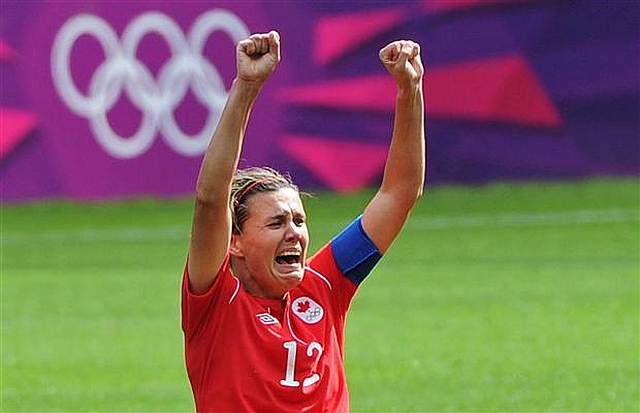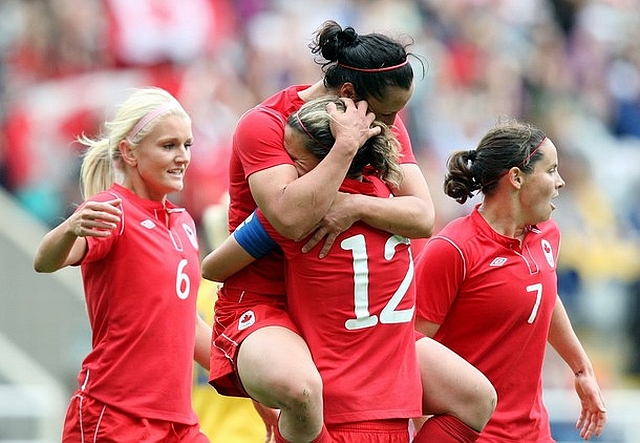
Photo courtesy AP
Sometimes you do everything you can and you still lose.
There is no doubt that the Canadian women’s national team that have turned out for these Olympics are better by far than the one that showed up for the Women’s World Cup in 2011. They work hard, they work together and they believed wholeheartedly that they could beat a team that bested them twice this year already, and all but three times in history.
But the number-one-ranked team in the world just had too much to offer. Canada held three separate leads against the United States before conceding on a free kick in the 123rd minute in extra time. There were no penalties and no historic win after all, as Canada fell 4-3 at Old Trafford. They will head back to Coventry for the bronze medal match, and the US will go to Wembley for a rematch of the World Cup final against Japan.
There was no shortage of foreboding before this game for Canadians. Every time these teams have met since 2001, Canada have come in as underdogs and tried to pull off a result, and every time the US came out ahead. No matter how good Canada looked against GB, America have shown no sign of weakness.
That’s why it was so astounding in the 22n minute when Christine Sinclair put Canada ahead. The US looked more dangerous early on, so Sinclair’s goal was the first indication that Canada might have a chance to contend. A product of great build-up play in the midfield, it was a great ball forward by Marie-Eve Nault to Tancredi that gave Sinclair the chance. She pulled right until she had an opening, and she buried it.
For the longest time the goal and the 1-0 scoreline stood. The energy of this game is such that there weren’t a lot of particularly direct chances; Erin McLeod had a lot more to contend with and the US made about 11 more shots than hit the goal, but it was playmaking that tested the most nerves. Canada were strong defensively, depending on a strong performance from Sophie Schmidt, a rock on the backline, and were able to ride it out till halftime.
And then, that goddamn second half. Megan Rapinoe punished poor organization to draw level for the US on a corner kick. An Olimpico (a direct goal from a corner kick) at the Olympics, it was the lack of a defender on the near post that saw the ball slide through Schmidt’s legs and in.
There was nothing like deflation in the response. Canada retained a decent share of possession, although neither team had the ball long without having it torn away by the other. Then on the 67th minute, a clearance attempt bounced back to the Canadian midfield, and after a few tests, Nault was able again to lift the ball down the left wing to Tancredi, who was able to cross in while the US defense was still on the run. Sinclair again was on hand to send a header just past Hope Solo’s glove on the right side.
The US were back to pressure McLeod immediately after conceding. The Americans benefit from solid organization and distribution, and this is how they kept it up in the immediate minutes after dropping it. The movement of the goal started from the midfield, with a long pass from Kelley O’Hara fifty yards down the left sideline finding Rapinoe just outside the right corner of the area. It settled flat at her feet, and she cut all the way across goal to bounce it in off the right goalpost, three minutes after the last goal.
And them, as soon as that happened, it whipsawed back the other way; on a Canada corner kick, somehow the movement flowed away from Sinclair at the same time as the ball came to her head. Two different US defenders tried to jump to head it–one away from her, one towards her–and ran into each other, and just like that the Canadian captain had a hat trick, giving her one more career goal than American talisman Abby Wambach. With 74 minutes left, if Canada could just hold on, they might be actually able to hold on and make it past the United States.
It’s hard to explain what happened next. It looked like McLeod handled outside the area at first, but what really took place was that on a goal kick, the Canadian keeper opted to punt the ball rather than place it and took eight seconds rather than six. Keepers are only allowed to hold for six, and so the referee called an automatic indirect free kick inside the area for delay of game, regardless of the fact that the play didn’t hold any of the usual cynicism of timewasting.
For a second, it looked like Canada had escaped the dangerous free kick, but then terror swept in as it became clear that the ball hit Nault’s arm. It was a penalty, and Wambach drew back even with Sinclair and Canada at 3-3. It’s this that have the Canadian fans the angriest. (We were rude on Twitter to Samuel L. Jackson!) The game’s refereeing was spotty throughout the game, but it was spotty in both directions. Rapinoe alone had two ball-to-arm scenarios that weren’t called, but then again Canada just flattened Wambach in the box a few times with no call.
It will not be the first time a team playing as the away team in Old Trafford will look skyward after conceding a penalty. It will not be the last time people say that the team that stepped up to take have the luck of champions.
But they had more than that. In extra time, both teams played a little surer and a little safer than they did before. But the Americans physically punished the Canadian defense and ground them down throughout the extra periods, and at the end of the day Alex Morgan was too far open and too ready to take the header. It wasn’t a referee that ended it, but a wide play and an open header.
The remaining half-minute was a formality. Unbelievably, frustratingly, undeniably, the US did it. That’s the maddening part of soccer; you could never explain exactly how Canada led three times and yet this game just became another loss on the piles of losses to the Americans except that the US were crazy, deadly good.
But Canada is too, and they aren’t done quite yet. The country is watching now (they won’t be watching-watching, though, as the game is at 5 AM on Thursday morning) and a bronze medal would be a way to tell them that Canada belonged here, that this is a sport we can win things in.
The match is in Coventry, a new home-away-from-home for Canada, against the French. It’s terrifying because of the nightmare that was the 4-0 loss in the group stages of the World Cup last year.
But Canada has come far since then.
Stats after the jump.
Continue reading →



